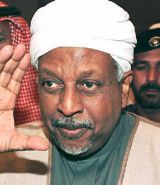Khartoum and opposition poised for landmark deal
CAIRO, June 18 (AFP) — Khartoum and Sudan’s largest opposition bloc were expected to sign a reconciliation agreement Saturday that observers said would boost a recent North-South peace deal and redefine the country’s political map.
 The deal between the Sudanese government and the National Democratic Alliance (NDA) would come five months after southern rebels put an end to their 21-year-old war and amid negotiations in Nigeria to resolve the crisis in Darfur.
The deal between the Sudanese government and the National Democratic Alliance (NDA) would come five months after southern rebels put an end to their 21-year-old war and amid negotiations in Nigeria to resolve the crisis in Darfur.
Egyptian President Hosni Mubarak, who has hosted the week-long round of negotiations, was due to meet opposition leaders Saturday before holding talks with Sudanese President Omar al-Beshir.
A signing ceremony is expected later in the day that would end a feud dating back to 1989, when a group of 13 parties formed an umbrella organisation to oppose the regime only weeks after Beshir seized power in a military coup.
The ceremony will include NDA chairman Mohamed Osman al-Mirghani and southern leader John Garang, whose Sudan People’s Liberation Movement is a member of the alliance but already signed a peace deal with Khartoum on January 9.
Besides the SPLM, the NDA includes Mirghani’s Democratic Unionist Party, one of Sudan’s oldest political movements, which draws support from the powerful Khatmiya brotherhood, as well as the communist party.
An agreement with the NDA would represent a significant boost to peace hopes in Africa’s largest country, a Nairobi-based expert on Sudan told AFP.
“The agreement with the NDA is essential for broadening the support base of the North-South peace agreement and improving the odds of its success,” said David Mozersky, an analyst with the International Crisis Group think-tank.
“But it would not be the end of the process in terms of bringing other political parties on board,” he added.
Two ethnic minority rebel groups — the Darfur-based Sudan Liberation Movement and the mainly Beja Eastern Front — are also members but any deal struck will not be binding on them.
The SLM is engaged in its own stop-start peace negotiations with the government in Nigeria, while the Eastern Front has an official promise of separate talks of its own.
The Umma party, a northern opposition movement with a large support base, dropped out of the NDA several years ago.
The main issues discussed by Khartoum and the NDA in Cairo were the fate of the opposition movement’s armed forces and power-sharing quotas set in the January peace deal for the interim period due to start on July 9.
As late as Friday afternoon, differences remained between negotiators on these points, NDA negotiator El-Tom Hago told AFP.
The Sudanese government was proposing opposition troops be compensated to return to civilian life while the NDA insisted its forces be assimilated into the regular army, he explained.
Intense haggling was also underway over the quotas allocated to each political player in the January 9 peace agreement, with the NDA demanding that the northern opposition’s 14 percent share be significantly increased.
The agreement expected to be signed Saturday would involve the subsequent dissolution of the NDA in its current form and eventually bring some of its members into the interim executive.
The current parliament dominated by Beshir’s National Congress party is due to be dissolved in the coming days, after it ratifies the North-South peace agreement.
While members of the future interim parliament and government will be appointed in accordance with the quotas reviewed in Saturday’s agreement, the political process mapped out in January provides for free elections in three years.
Observers noted that by making up with the NDA, Beshir brings some of his most serious rivals back into the fold and also consolidates a northern Arab alliance able to counter John Garang’s attempts to build a broad non-Arab alliance covering most of southern and western Sudan
